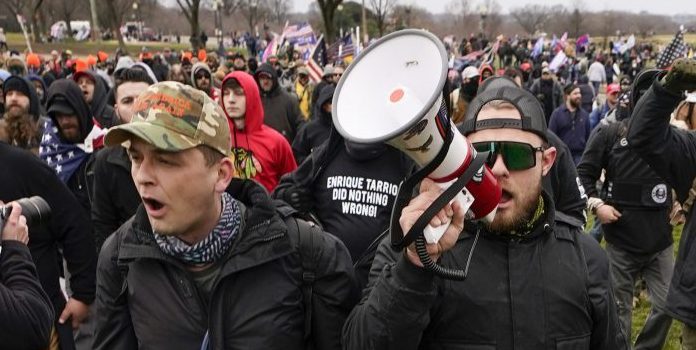(Ken Silva, Headline USA) Attorney General Merrick Garland is allegedly using the same tactic he may have learned nearly 30 years ago when he helped prosecute Oklahoma City bomber Timothy McVeigh: using FBI informants to spy on defense teams.
Zachary Rehl, one of the defendants in the ongoing Proud Boys sedition conspiracy trial, filed a motion Wednesday for the DOJ to provide him with all government records about FBI informants or other witnesses that may have provided the bureau with information about the defense.
Rehl’s filing came after he said he learned that a person he planned on using as a defense witness had, in fact, been working as an FBI informant from at least April 2021 to January 2023.
“During this period of time, the [informant] has been in contact via telephone, text messaging and other electronic means, with one or more of the counsel for the defense and at least one defendant … The [informant] also participated in prayer meetings with members of one or more of the defendants’ families,” Rehl said in his motion.
“The [informant] also engaged in discussions with one of the defendant’s family members about replacing one of the defense counsels.”
The defendants requested an immediate emergency hearing and adjournment of the court proceedings until these issues have been considered and resolved. The presiding judge reportedly ordered the DOJ to respond to the motion by Thursday morning at 9 a.m.
The DOJ using FBI informants to spy on defense teams has precedent. This happened to McVeigh’s defense team in May 1995—right at the time when Garland was helping the DOJ to prosecute the bomber.
The May 1995 FBI memo said a special agent received information from an informant that a woman named Wilma Sparks was joining McVeigh’s team.
“The [informant] advised that WILMA SPARKS is a close associate of the [informant] and that SPARKS is taking on the responsibility of investigating certain aspects of the investigation,” the memo said. “SPARKS advised the [informant] that although this was a distasteful assignment, she was willing to accept the assignment to ensure that the case against MCVEIGH will not be overturned due to incompetent counsel.”
McVeigh’s lead defense counsel, Stephen Jones, declined to comment on the memo, which was first discovered by Utah attorney Jesse Trentadue and his fellow investigator, Roger Charles.
Trentadue used this memo—as well as a slew of records showing that the FBI had informants in the media—to sue the FBI for all records about its “sensitive informant program,” which is used to embed informants in the media, congressional offices, churches, defense teams and other “sensitive” institutions.
Trentadue’s lawsuit was ultimately unsuccessful, as a judge ruled in 2015 that the FBI could to exercise FOIA’s national security exemptions to keep information about its sensitive informants secret.
Trentadue has told Headline USA that he hopes the newly formed House select subcommittee to investigate the weaponization of the federal government will resume what his lawsuit started.
Ken Silva is a staff writer at Headline USA. Follow him at twitter.com/jd_cashless.

